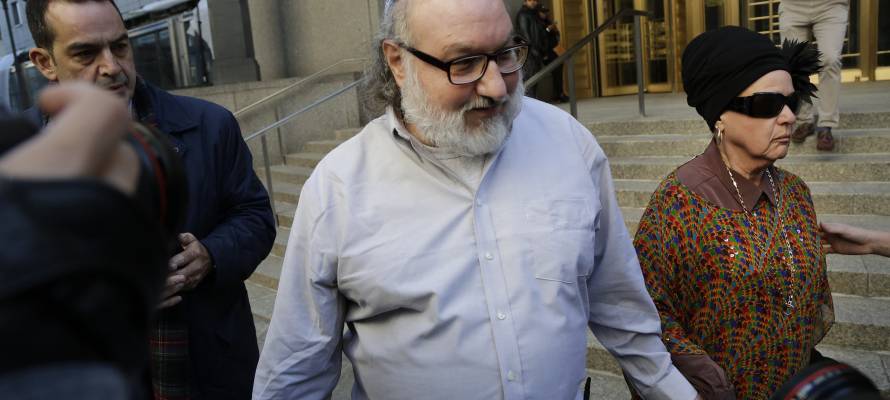Leaders of the US intelligence community have petitioned against easing the parole conditions of convicted spy Jonathan Pollard, on the grounds that doing so would breach national security. Other prominent US officials — such as former CIA director James Woolsey and former US secretaries of state George Shultz and Henry Kissinger — have called for Pollard’s unusually harsh sentence to be commuted.
By: The Algemeiner
Petitioners claimed that though Pollard — a former US intelligence analyst who shared classified secrets with Israel — was imprisoned for more than 30 years, he still holds top-secret information that, if divulged, could harm American interests, the Daily Beast reported on Tuesday.
Since his release from federal prison last year, Pollard has been living in New York City under very strict, and possibly unreasonable, parole conditions. He has petitioned the US Parole Commission to stop the monitoring of his and any potential employer’s computer — something that caused a job offer as a research analyst to be rescinded — and to remove the GPS monitoring ankle bracelet, which he claims is causing him to have health problems and to violate the Sabbath and Jewish holidays.
According to a declaration against Pollard filed on Friday by Jennifer L. Hudson, a senior official in the Office of the Director of National Intelligence (DNI):
Intelligence Community (IC) elements have confirmed that certain information believed to have been compromised by Mr. Pollard remains currently and properly classified at the Top Secret and Secret levels. As such, any unauthorized disclosure of this information could risk harm to our national security, as it could enable terrorist organizations, foreign intelligence services, and other hostile groups to discern and thwart the use of particular sources and methods to collect such information…to our detriment…Some of the sources and methods used to develop some of intelligence exposed by Mr. Pollard not only remain classified but are still in use by the Intelligence Community today.
Hudson is not the only intelligence official to come out against easing Pollard’s parole. In February, invoking national security, DNI Director James Clapper issued his own warning to the US Parole Commission, writing:
Mr. Pollard was convicted to conspiring to deliver national defense information to a foreign government…IC elements have confirmed that certain information compromised by Mr. Pollard remains currently and properly classified at the Top Secret and Secret levels…the unauthorized disclosure of which could reasonably be expected to cause exceptionally grave damage to the national security…
The IC believe then, and still believes, that the imposition of special conditions would be an appropriate means to mitigate concerns of future unauthorized disclosures of classified information by Mr. Pollard.
In response to Clapper’s claims, Pollard’s lawyers wrote a letter to the US Parole Commission, which stated, “Even assuming some information is still ‘classified’ as a practical matter, it is extremely unlikely that Mr. Pollard remembers, or could possibly remember, the details of 30-year old information to an extent that it could be of any value to anyone.”
The lawyers argued that current parole conditions would feasibly not prevent Pollard from disclosing sensitive information, “even though he has no such information and has not intention of jeopardizing his freedom.”
“There simply is no relationship between the underlying offense and the need to monitor Mr. Pollard’s whereabouts, where the commission’s supposed concern is a conversation that could theoretically occur anywhere,” they wrote. “Mr. Pollard’s ability to disclose supposedly confidential information could occur at any time of day. And the monitoring of Mr. Pollard’s computer use would not prevent him from disclosing the classified information in person, over the phone, or via regular mail.”
According to a former US intelligence official familiar with Pollard’s case who spoke with the Daily Beast, while there is “no doubt” that Pollard probably knows information that is still pertinent to US national security, a different, unspoken motivation is driving the intelligence community in relation to Pollard’s parole conditions.
“They want to f**k with him,” the former official said.
In 1987 — despite entering into a plea agreement with the US government and pleading guilty to one count of providing defense information to a foreign government — Pollard was handed down the maximum punishment and sentenced to life imprisonment. Prominent US officials — such as former CIA director James Woolsey and former US secretaries of state George Shultz and Henry Kissinger — called for Pollard’s unusually harsh sentence to be commuted. On November 20, 2015, following a 30-year prison term — and what some suspect was the Obama administration’s attempt to placate Israel over the Iran nuclear deal — Pollard was released.
Aside from having his computer activity and physical movement monitored, Pollard has a strict curfew and is forbidden from leaving the US for five years. This restriction is reportedly aimed at preventing him from going to Israel, where he granted citizenship by the Knesset during his incarceration.
